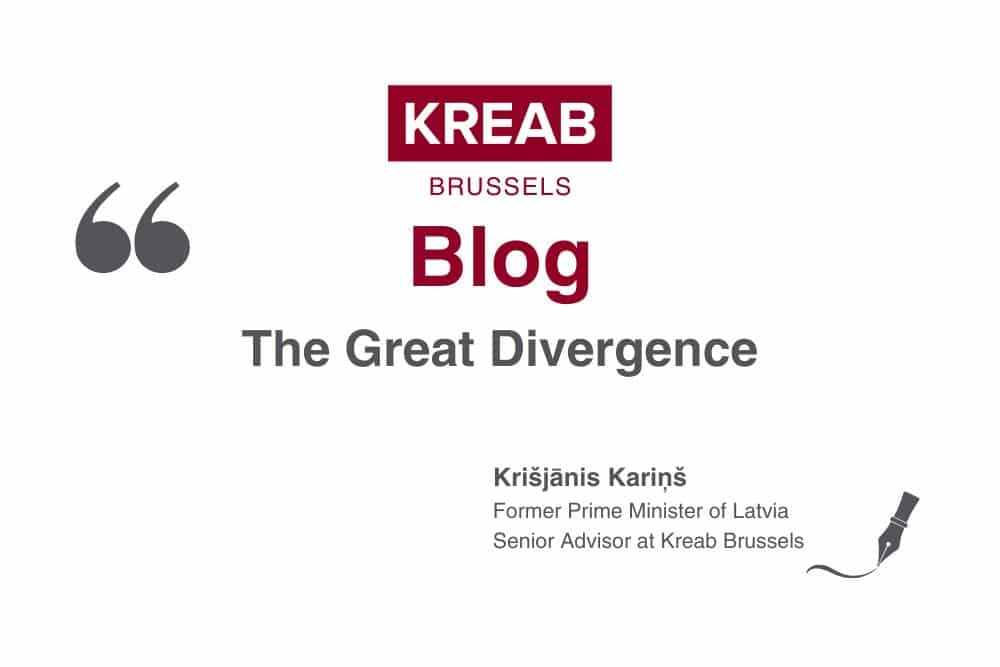
24/02/2025
The Great Divergence
By Krišjānis Kariņš, former Prime Minister of Latvia, now Senior Advisor at KREAB Brussels
As the full-scale Russian war of aggression against Ukraine marks its third full year today, the rate of geopolitical change is increasing. Three years ago, outright imperialistic war returned to Europe. As the Ukrainians bravely and effectively fought off the invaders, the NATO alliance became reinvigorated, adding two new members, Finland and Sweden. European countries rallied behind Ukraine and have been supplying it with weapons, munitions, humanitarian aid, and cash. Under the Biden administration, the US served as the captain of the effort, initially sharing classified information with NATO allies regarding Russia’s military build-up on the Ukrainian border before the outright war started, then rallying allied support, organising military deliveries to Ukraine through the Ramstein format, and beefing up its own military presence in Europe.
With the new Trump presidency comes a radically different US approach to foreign policy, whereby (at least rhetorically) the US president appears to be siding with the aggressor Putin and verbally attacking the victim of the aggression – the Ukrainian president Zelensky. Meanwhile in Kyiv today, European leaders gather to express support for Ukraine and pledge new assistance. The great divergence of US and European interests thus begins.
Following the German elections yesterday, Friedrich Merz, the leader of the centre-right, appears to have a clear path to becoming the next German Chancellor. On the evening of his election victory, Merz already expressed the need for Europe to become “independent” of the US, and indicated that he wishes to lead not only Germany, but push for Europe to become much stronger. It looks like the German cylinder of the European engine is getting ready to be fired up once again. Merz is well-placed to provide very needed leadership in the EU, which has been lacking since Macron lost the snap parliamentary elections in France last June, and the previous
German government fell apart in November of last year.
Europe works best in a crisis. During the Covid pandemic, the EU was able to effectively coordinate both the acquisition of vaccines for its citizens, as well as agree to a (novel) common debt mechanism to revive the economy following the deadly crisis. The tremendous political shockwave that president Trump has now sent throughout Europe will most likely act as a catalyst for Europe to finally act and take over the primary responsibility for its own defence and the defence of Ukraine if and when a peace deal could be reached that is also acceptable to the Ukrainians.
The reality, however, is that currently without US military support, European NATO defences would be incomplete at best. The many years of underinvestment in most large European countries has taken its toll. All US presidents since 2011 have been exhorting their European partners to invest more, but it seems that president Trump is the one who will (finally) compel European leaders to act and take up responsibility for their own defence. For the sake of Ukraine’s independence and the broader security of Europe as a whole, how the process of diverging US and European interests is handled becomes key.
It is directly in the interests of both Europe and the US that the NATO alliance remains intact. For Europe, NATO is the mechanism of collective defence. For the US, NATO is a vehicle that amplifies its own power. Merz speaks of Europe becoming “independent” of the US. If this is understood as “self sufficient” from a military point of view, then the NATO alliance could evolve to be a healthy interdependent relationship between Europe and the US to the benefit of both. To achieve this goal, it is crucial that the US remains engaged in Europe as the Europeans invest to build up their collective military capabilities. This process will take time.
What is clear is that the 80-year old relationship between the US and Europe is in a profound process of divergence. The US wants to and needs to focus its energies on China and the Pacific. This is not only a Trump phenomenon. Europe, in turn, needs to use the perceived “crisis” of the Trump presidency to not only become militarily self-sufficient, but also economically much stronger. This is possible by finally enacting the well known reforms to complete the single market. The US is clearly a major geopolitical player. Before Europe can turn outward as a geopolitical player, it first needs to (finally) become internally strong. The result of the German election gives hope that much-need leadership could be returning in Europe. The “great divergence”, if handled correctly, could come to the benefit of both the US and Europe. Crucially, the process needs to be guided by wisdom, not emotion.
